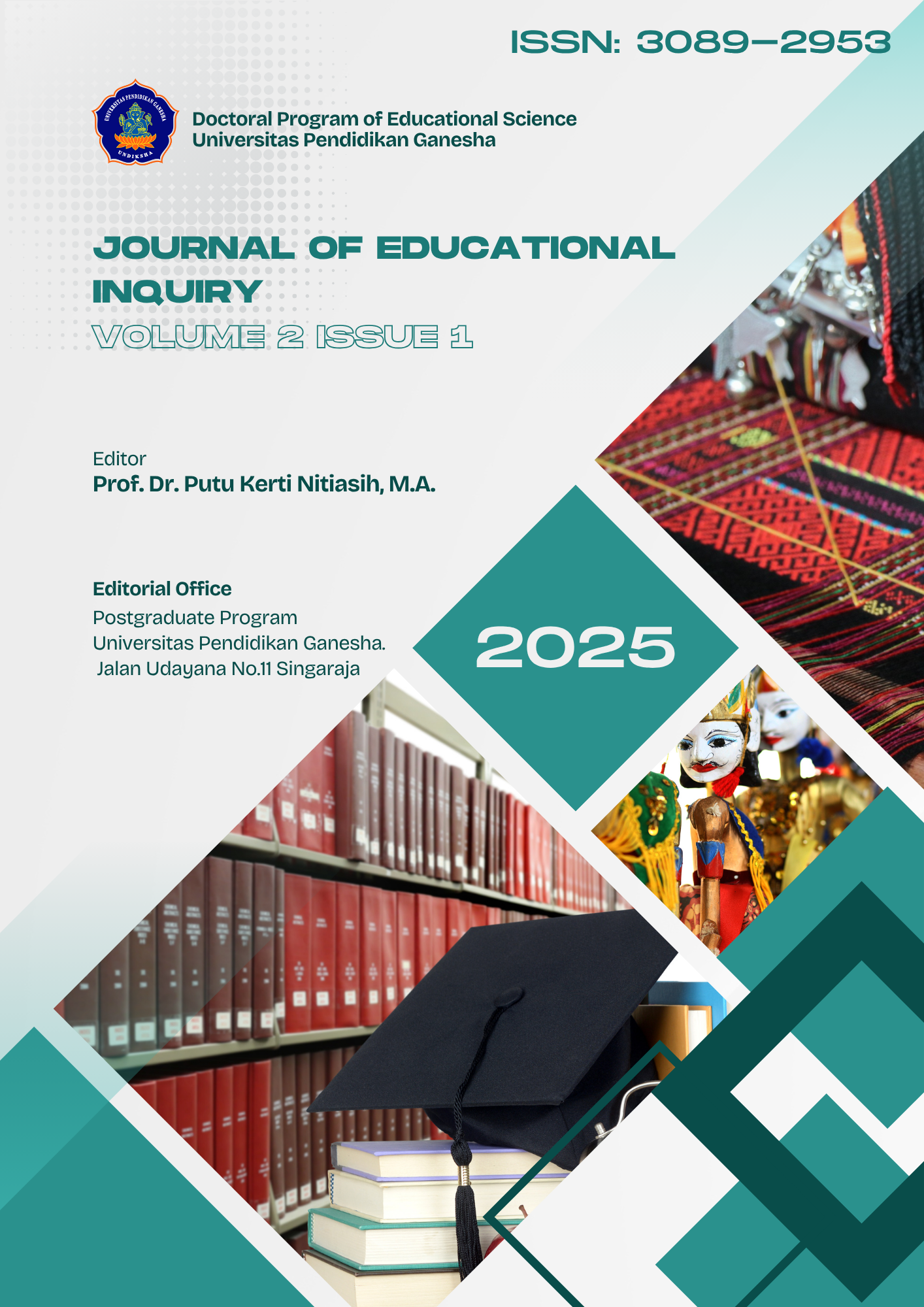The Twin Tower: Integrating Soft Skill and Hard Skill of Generation Z Through Vocational Curricullum Development
Abstract
This study aims to identify the skill gap between the competencies of Generation Z and the needs of the industry, especially in the hospitality sector. Through systematic literature review and semi-in-depth interviews with five managers of global hotel companies, this study employed thematic analysis. The study found that although Generation Z has relatively mastered technical skills (hard skills), they still have difficulty in understanding and implementing standard operating procedures (SOP) consistently and completely. On the other hand, soft skills such as communication, initiative, work motivation, and the ability to build relationships with customers are also still relatively low. This gap is a major challenge in increasing the employability of vocational high school graduates as Generation Z in the digital era and Industry 4.0. Therefore, the development of vocational high school curriculum needs to be carried out holistically by integrating project-based learning, problem-solving, and instilling the values of empathy, responsibility, and digital literacy. Close collaboration between the world of education and industry is the key to creating graduates who are adaptive, professional, and ready to face changes in the world of the tourism and hospitality industry.
References
Başer, M. Y., Kozak, M., & Büyükbeşe, T. (2025). Integration of emerging technologies in tourism and hospitality curriculum: An international perspective. Journal of Hospitality, Leisure, Sport & Tourism Education, 36, 100546. https://doi.org/10.1016/j.jhlste.2025.100546
Dutta, D., Vedak, C., & Joseph, V. (2024). New hire performance: identifying critical traits for hospitality industry. Tourism Review, 79(1), 69–84. https://doi.org/10.1108/TR-11-2022-0565
Gounaris, S., Chatzipanagiotou, K., Karantinou, K., & Koritos, C. D. (2025). Revisiting the effects of tourism and hospitality servicescapes on customers: A complexity approach. Tourism Management, 107, 105068. https://doi.org/10.1016/j.tourman.2024.105068
Grobbelaar, W., & Verma, A. (2024). Future employments in the hospitality industry. In Artificial Intelligence for Smart Technology in the Hospitality and Tourism Industry (pp. 77-104). Apple Academic Press.
Huang, A., & Baker, M. (2021). Exploring skill-based career transitions for entry-level hospitality and tourism workers. Journal of Hospitality and Tourism Management, 48, 368–373. https://doi.org/10.1016/j.jhtm.2021.07.007
Huang, A. Y., Fisher, T., Ding, H., & Guo, Z. (2021). A network analysis of cross-occupational skill transferability for the hospitality industry. International Journal of Contemporary Hospitality Management, 33(12), 4215–4236. https://doi.org/10.1108/IJCHM-01-2021-0073
Hussain, S., Singh, A. M., Mohanty, P., & Gavinolla, M. R. (2023). Next generation employability and career sustainability in the hospitality industry 5.0. Worldwide Hospitality and Tourism Themes, 15(3), 308–321. https://doi.org/10.1108/WHATT-01-2023-0011
Indrayani, I. G. A. P. W., Supartha, I. W. G., Dewi, I. G. A. M., & Piartrini, P. S. (2023). A systematic approach to resourceful work engagement among millennials: harnessing personal resources. International Journal of Business and Society, 24(2), 727–745. https://doi.org/10.33736/ijbs.5959.2023
Innerhofer, J., Nasta, L., & Zehrer, A. (2024). Antecedents of labor shortage in the rural hospitality industry: a comparative study of employees and employers. Journal of Hospitality and Tourism Insights, 7(1), 28–55. https://doi.org/10.1108/JHTI-04-2022-0125
Marneros, S., Papageorgiou, G., & Efstathiades, A. (2020). Identifying key success competencies for the hospitality industry: the perspectives of professionals. Journal of Teaching in Travel & Tourism, 20(4), 237–261. https://doi.org/10.1080/15313220.2020.1745732
Morrone, D., Tarulli, A., Silvestri, R., & Santovito, S. (2024). Generation Z, tourism and hospitality: the legacy of COVID-19. British Food Journal, 126(1), 205–222. https://doi.org/10.1108/BFJ-11-2022-0972
Ngcobo, N. F., Chiwawa, N., & Wissink, H. (2022). Emotional labour: The effects of genuine acting on employee performance in the service industry. SA Journal of Human Resource Management, 20. https://doi.org/10.4102/sajhrm.v20i0.1583
Papageorgiou, G., Marneros, S., & Efstathiades, A. (2024). Predicting career success in the hospitality industry of Cyprus: a competency-based approach. Journal of Teaching in Travel & Tourism, 24(3), 236–268. https://doi.org/10.1080/15313220.2024.2341616
Parvez, M. O., Öztüren, A., Cobanoglu, C., Arasli, H., & Eluwole, K. K. (2022). Employees’ perception of robots and robot-induced unemployment in hospitality industry under COVID-19 pandemic. International Journal of Hospitality Management, 107, 103336. https://doi.org/10.1016/j.ijhm.2022.103336
Purwanto, M. B., Yuliasri, I., Widhiyanto, W., & Rozi, F. (2024, November). Interactive learning for hospitality students: An action research on combining role-play with multimedia technology. In Proceedings of UNNES-TEFLIN National Conference (Vol. 6, pp. 635-645).
Sakdiyakorn, M., Golubovskaya, M., & Solnet, D. (2021). Understanding Generation Z through collective consciousness: Impacts for hospitality work and employment. International Journal of Hospitality Management, 94, 102822. https://doi.org/10.1016/j.ijhm.2020.102822
Seyfi, S., Vo-Thanh, T., & Zaman, M. (2024). Hospitality in the age of Gen Z: a critical reflection on evolving customer and workforce expectations. International Journal of Contemporary Hospitality Management, 36(13), 118–134. https://doi.org/10.1108/IJCHM-01-2024-0035
Seyitoğlu, F., Costa, C., Martins, M., & Malta, A. M. (2023). The future of tourism and hospitality labour: challenges, requirements, trends, skills and the impact of technology. Current Issues in Tourism, 1–15. https://doi.org/10.1080/13683500.2023.2286291
Silitonga, P. (2021). Competency-based education: a multi-variable study of tourism vocational high school graduates. Journal of Teaching in Travel & Tourism, 21(1), 72–90. https://doi.org/10.1080/15313220.2020.1820427
Singh, A., & Hassan, S. C. (2024). Identifying the Skill Gap in the Workplace and Their Challenges in Hospitality and Tourism Organisations (pp. 101–114). https://doi.org/10.1108/S1569-37592024000112B006
Tian, J. (2024). Does technological innovation have an impact on employment in the hospitality industry? International Journal of Contemporary Hospitality Management, 36(4), 1025–1043. https://doi.org/10.1108/IJCHM-03-2022-0370
Zgraggen, M. (2021). Blended learning model in a vocational educational training hospitality setting: from teachers’ perspectives. International Journal of Training Research, 19(3), 202–228. https://doi.org/10.1080/14480220.2021.1933568
Copyright (c) 2025 I Gusti Ayu Putu Wita Indrayani

This work is licensed under a Creative Commons Attribution-ShareAlike 4.0 International License.
Author who publishes in the IJEI agrees to the following terms:
- Author retains the copyright and grants the journal the right of first publication of the work simultaneously licensed under the Creative Commons Attribution-ShareAlike 4.0 License that allows others to share the work with an acknowledgement of the work's authorship and initial publication in this journal
- Author is able to enter into separate, additional contractual arrangements for the non-exclusive distribution of the journal's published version of the work (e.g., post it to an institutional repository or publish it in a book) with the acknowledgement of its initial publication in this journal.
- Author is permitted and encouraged to post his/her work online (e.g., in institutional repositories or on their website) prior to and during the submission process, as it can lead to productive exchanges, as well as earlier and greater citation of the published work (See The Effect of Open Access).










